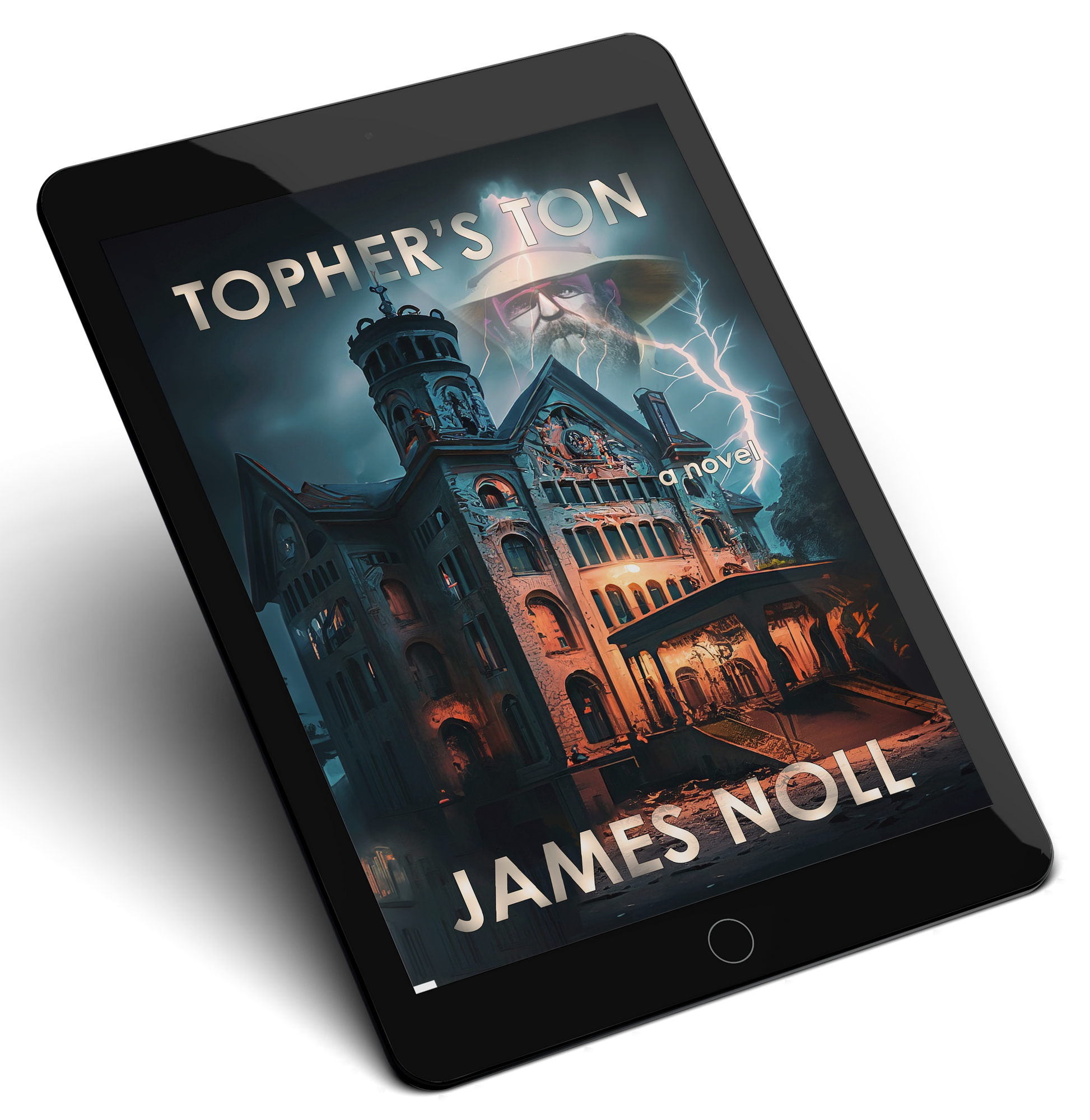Topher's Ton
Topher's Ton
Book The Third in the Transcendental Trackers Trilogy
Amidst global apocalypse, Topher Bill builds Topherton, a hopeful sanctuary in Virginia's ruins, only to face a new lethal disease and sinister enemies on a perilous quest for a future against overwhelming odds.
Couldn't load pickup availability
In Topher's Ton, the world as we know it ends in a cataclysmic frenzy of destruction—bombs raining from the skies, tsunamis swallowing coastlines, and meteors pelting the earth. Amidst this chaos, Topher Bill emerges, scarred by his past encounter with a serial killer but determined to forge a new path. In the heart of Virginia, he establishes Topherton, a beacon of hope amidst the desolation—an oasis of enlightenment in a world plunged into darkness. Yet, just as hope begins to flicker, a deadly disease sweeps through his people, forcing Topher and his fellow survivors to flee across the Commonwealth in search of sanctuary.
Their journey is fraught with peril, with threats lurking at every turn. Rasheed, a demented boy-god with a tank; Nurse Smith, the twisted leader of a group of malevolent psychologists; and Liam Chris, a vengeful despot—all stand in their way, threatening to crush their hopes of finding a new home.
In Topher's Ton, survival isn't just about outlasting the apocalypse, it's about navigating treacherous landscapes, battling sinister foes, and confronting the darkest corners of the human soul. Join Topher and his companions on an epic quest for redemption, as they fight to carve out a future in a world teetering on the brink of oblivion.
Read a Chapter
Read a Chapter
Survival of the Fittest
It was the end of the world, and Topher needed a new linen suit. Unfortunately, some maniacs from the west attacked his caravan before he could find one, so he had to put off the search until later, unless he died, of course, in which case the point was moot. But at least he’d put on clean underwear, not that going into battle wearing soiled undergarments was even an option. It was a longstanding Bill family tradition to put on clean underthings before all major life events, stretching back to the days of Wilhelm Bill the Mangler who, having married into French aristocracy, fought against his homeland during the Franco-Prussian War, thus earning the title Wilhelm Bill the Sonofabitch. Besides, Topher considered himself a gentleman, and gentlemen did not die while wearing dirty drawers.
But he wasn’t dead. Not yet.
He had a battle to win, crazy people to kill, so he did what great leaders did: he strode through the maelstrom of bullets and grenades, Molotov cocktails and flamethrowers, arsenic-laced bullets, whip-cracks, moans, shrieks, and cries, and barked orders until his voice went hoarse.
Then a spear zipped by his head and he nearly soiled himself.
To make matters worse, a gust of wind kicked up dirt all around him and dirtied his beard. He passed through it, cursing, coughing, wiping his eyes with his sleeve. It occurred to him to do something impressive, perform some kind of daring feat, so he removed his Panama hat and knocked it against his thigh.
“Mayor Bill!” someone shouted.
A short, skinny young woman ran up to him. She had smooth, olive skin and a thin, angular face, and she wore thick, oversized glasses that perpetually slid down her nose. Her curly thatch of black hair was tangled and filthy, and she hid it beneath an old Redskins baseball cap. Her name was Saanvi.
“Saanvi,” Topher said. “I told you to man the flamethrowers.”
Saanvi struggled to maintain her composure. The shouts and screams, the occasional bullet, all of them wreaked havoc with her sensory issues. Plus, she was afraid of dying. She blinked and flinched with each bullet fired and each explosion, but squashed the desire to run. This wasn’t her first firefight, and the best cure was exposure. The best cure was exposure. The best cure was–
“Saanvi!”
She shook it off.
“We’re out of gas.”
“What? We can’t be out of gas. We had plenty before.”
“We ran out. We were just trying to use the flamethrowers, but–”
“Goddammit!”
“What do you want us to do?”
“I don’t know. Throw the flamethrowers!”
Topher stomped away, Saanvi trotting close behind.
“Throw the flamethrowers?”
“Why do you think they call it a flamethrower?”
“But that’s stupid. We’ll find gas somewhere else. What if the enemy has some?”
A bullet ricocheted off the top of a nearby truck. Saanvi ducked. Topher didn’t.
“There’s no way they can have any gas.”
“They probably thought the same thing about us.”
“Not anymore.”
Saanvi blinked hard, forcing herself to answer rather than react.
“Mayor, they’re going to breach the ring!”
“Then throw rocks at them. And stop calling me ‘Mayor’.”
“Rocks?”
Topher stopped abruptly and spun around.
“Yes. Rocks. And when they breach the ring, break their skulls with your fists, and when they break your fists, tear them apart with your teeth, and when they break out your teeth, head-butt their eye sockets, kick them, lick them, spit on them, do something! Do something! Do anything except follow me around repeating every suggestion I make like some kind of deranged cockatiel!”
Saanvi opened her mouth to argue but thought better of it. She snapped a quick salute and turned on her heel.
“Wait,” he called after.
A white flash interrupted him, followed by a roar and then black silence.
Topher gasped awake, head pounding. The battle was done, replaced by nothingness. No bullets, no enemies, no explosions, no dust. Somebody cried out in the distance. He sat up and looked around. To the left, hunks of metal and glass entwined with body parts. To the right, blackened frames of cars. A burning rubber tire rolled by, turned, and wound to a stop like a quarter on a table. He watched it.
My God, he thought. It’s over. It’s truly over.
He thought maybe he should feel something. Anger, perhaps? Rage? Fear? Guilt? He’d let everyone down, after all. His men were dead. But he didn’t feel anything remotely close to any of that. In fact, all he felt was relief. He always knew the day would come, the day when he lost, when he would die, and waiting for it was worse than it actually happening. Now he didn’t have to worry anymore about anything, about his men, about the children, about the illness, about gangrene, about dehydration, about getting an infection, about losing an arm, about hunger, shelter, or someone slitting his throat in his sleep. He stood up, giddy, and swayed in place. A body lay nearby, and he stumbled over to it, stuffed his boot under its chest, and flipped it over.
Not one of his men.
He did the same to the next body and the next. Not his. Not his. None of them were his. So wait. The idiots had somehow bombed their own people. They’d bombed their own people and didn’t even know it.
He sighed.
He’d won again.
The stupidity was galling. He might be ready to die, but it wasn’t going to be at the hands of morons. He looked around for a weapon, something with which to brain a skull, or stab a gut, or slit an artery, and there, a few feet away, lay a morning star made out of nails and a piece of rebar. He picked it up.
“Perfect,” he said, and weighed it in his hands.
But before he could plot anymore, before he could mock his enemies and praise his superiority, a familiar voice rang out. He paused, listening, and there it was again, cutting through the screams and the pain and the moans of the dying.
“Onward, you apes!” it cried. Topher swung in its direction. “Don’t stop until your hands have wrung the necks of every last one! Don’t stop wringing their necks until your palms meet! Cry havoc, and let loose the dogs of war!”
He was in shock. That voice. Could it be? Saanvi suddenly appeared, her face covered in soot, her glasses hanging at an odd angle. She grabbed his arm.
“Mayor, we’re done. We’ve got to run.”
He shook her off.
“We’re not going anywhere.”
He broke into a trot, heading for the voice, leaving her there.
A savage leaped into his path, all wild hair and ululations and bad teeth, and Topher buried the rebar in his chest. Another flew at him and he clothes-lined him. A strong wind collapsed upon them. Storm clouds rolled in. Fat drops of rain spattered on the asphalt.
Topher jumped up on the hood of a burned-out wreck. There, in the midst of all the carnage, stood a bearded man wearing fur pants and a fur jacket, screaming into the wind.
“Where are you?” he cried. “Fight! Fight!”
Then he spotted Topher and froze, amazed, petrified. His beard flew up into his face and he clawed it away.
“Oh dear god, no. Not you,” he said.
Topher let up a whoop.
“Zorn!” he cried. “Zorn, you idiot! It’s ‘let slip the dogs of war’!”
Topher sent Saanvi to retrieve their people, the horses, the food truck and the children, while he and the surviving men set up camp by the side of the road. The worst of the storm had passed, washing the highway clean, and a fine mist took its place as evening settled. The peepers in the woods started to sing. When she returned, Saanvi wove through the tents, looking for where Topher had set his up. She’d lost her cap, and the mist dampened her hair, decorating it with little crystal dew drops. She paused for a moment to take a breath before going inside, and she was just about to say something when Topher erupted with laughter from inside.
Laughter always made her feel uncomfortable. In fact, of the many things that made her feel uncomfortable—facial expressions, abstract art, disorganized closets—humor made her feel the worst. No. That wasn’t entirely true. She liked humor when she was the one responsible for it, but when it came to discrepancies, particularly those for which she was unprepared, she possessed the tact of a sledgehammer. Why was Dali considered brilliant? All he did was make things look weird. And what was the deal with puns? There was nothing funny about homonyms. Why was the Mayor laughing after dozens of people were killed? War and death weren’t funny.
One of the enemy savages passed by. He was all beard and belly and wild hair, but he’d changed into khaki pants and a tattered blue Oxford. He stopped when he saw her and said, “Barry.”
He held out his hand. Saanvi looked at it. She knew she was supposed to shake it. Social niceties demanded acceptance of another’s presence via rigorous digital manipulation. But of all the appendages on the human body, the hands and fingers harbored the most disease, and in this post-antibiotic world, one could never be too careful. She clasped her hands behind her back.
“Saanvi,” she said.
Barry faltered and let his hand drop.
“I was a dentist.”
Saanvi nodded.
“I was in a mental institution.”
Barry laughed.
“Then I guess things haven’t changed very much for you at all, have they?”
Saanvi watched him as he walked away. Of course things had changed. One, she never slept in the same bed twice anymore. Two, no more Tapioca Tuesday. Three, living outdoors resulted in a distinct lack of hygiene. Four.
She stopped herself.
The list could have gone on forever if she didn’t. Her hand automatically went for her right sleeve, which she always kept buttoned around her wrist. Nobody needed to see her arm. It led to questions, and rather than answer them honestly, she lied, which was hard for her to do because it wasn’t real and things that weren’t real made her anxious and anxiety reminded her of father and his rules and his punishments and his expectations, so rather than give anybody the opportunity to ask her about her scars, she kept her sleeves buttoned. When she needed to, she felt them over her shirt. She decided to repeat the number four times and then stop.
Four.
Four.
Four.
Four.
And that was it.
She balled her fists, tensing up the muscles in her arms and back, held it for a few seconds, then let it all go with a ragged breath.
The compulsion was gone.
Her mind was clear.
The Mayor laughed again at one of his own jokes. He often did that, but this time she decided that it might actually make sense. From what she understood, he and the savage leader were old acquaintances, college roommates or something. If they had truly found each other, then they would be happy, and when people were happy they sometimes laughed. She smoothed her dirty clothes and knocked on the tent flap.
From inside a voice said, “Did someone just knock on the tent flap?”
It was the savage leader. The Mayor said his name was Zorn, but that was an odd name because she’d never met anybody named Zorn before. It didn’t help when, after the battle, he explained to her that Zorn was his friend’s last name.
“What’s his first name, then?” she’d asked.
“Michael.”
“Then why don’t you call him Michael?”
“Because I call him Zorn.”
“But that doesn’t make sense.”
“Saanvi, what’s your last name?”
“Fickerald.”
“Fickerald? Your name is Saanvi Fickerald?”
“My father was white.”
Topher took a breath.
“If you don’t stop talking to me about this, I’m going to refer to you as Fickerald from now on.”
“But why?”
“Does it make you anxious?”
Saanvi thought. Her hand trailed to her cuff.
“It makes me very anxious.”
“Then you have your answer.”
Saanvi knocked on the flap again.
“It’s probably Saanvi,” the Mayor grumbled. Then, in a louder, exaggeratedly pleasant voice, he said, “Enter, Saanvi. No need to knock.”
She ducked inside. The Mayor and Zorn were propped up in lawn chairs, each holding a jar of Ton Brew. A small fire crackled in between them, and a thin line of smoke rose up into the air and out of the little circular hole in the top. It was quite warm and cozy.
“Zorn, this is Saanvi.”
Zorn said, “Hello.”
Saanvi looked at him.
“Your name is Michael but the Mayor calls you Zorn.”
“Yes. People have called me that my entire life.”
“I understand nicknames. The Mayor says people use them when they’re friends. He said it is a ‘term of endearment.’ But that’s not how people used it on me.”
Zorn took a sip from his jar.
“How did they use it on you?”
“My last name is Fickerald, but they called me Fucktardal.”
Topher suddenly felt horrible. As strange as the woman was, he hated bullies, and she’d obviously suffered more than one in her past, and he had reminded her of it, before, when he threatened to call her by her last name. He put his jar on the ground and leaned forward, resting his elbows on his knees.
“What can we do for you, Saanvi?”
“I made a report of the damages and casualties, Mayor.”
“You didn’t have to do that.”
“Right now I’ve counted thirty-seven injured and two dead. Six of the cars are destroyed, and we’ll have to replace almost all the tires. But the animals are safe, and our supplies and civilians.”
Topher gaped.
“Only two dead? Are you sure? I could have sworn I saw more.”
“I was only counting our people. We’re okay. Michael Zorn’s people, though . . . .”
Zorn remained silent, pressing his lips together until they were white.
Saanvi said, “I met a man named Barry outside. He was a dentist.”
“Barry’s alive?” Zorn asked.
Saanvi glanced at him, confused. Hadn’t she just told him that? She was about to explain this to him but remembered what the Mayor had told her about stating the obvious. Instead, she said, “Would you like to know the names of the dead, sir?”
Topher thought for a moment, then said, “No.”
“But, sir.”
“All I want to know is if you’ve burned them yet.”
Saanvi’s face turned red.
“It’s wet out, Mayor.”
“So?”
“We’re out of gas. You know we’re out of gas. I told you we were out of gas. Before. During the fight. You told me to throw rocks.”
“Saanvi, I don’t have to remind you what happens if we don’t burn them.”
“No, sir.”
“Then find a way.”
Saanvi gave him a clipped nod and left without another word.
Zorn took a sip of his beer.
“I can’t believe this is happening,” he said.
“Me, too.”
“The last time I saw you was on Riddle’s couch.”
“Did I show you what that crazy bastard did to me?”
“No.”
Topher took off his boots and socks and showed him what was left of his toes.
“Why?” Zorn asked.
“He was going to use me as fertilizer.” He put his socks back on, navigating the holes with his remaining digits. “Said he was a ‘connoisseur’. Had a trophy case with decapitated heads in it. Reinholdt was there. Well, his head was. Can you imagine how horrible that would have been for me? Spending eternity next to that dumb bastard?”
Zorn grimaced. He finished his drink and set the jar on the ground.
“I don’t know what he had in store for me. One moment I was on his couch, dropping off to sleep, the next, I woke up in a basement in California.”
“My God.”
Zorn looked around the tent, listened to the rain patter outside.
“You seem to have done well.”
“Riddle had a bunker,” Topher said.
“What?”
“A bunker. Under the pump house. It’s how I survived. After the radiation died out and the flood waters receded, I had everything I needed. Seeds. Books. Guns. Ammo. He actually had a press and bullets, powder and casings. I’ve got it all here, too.”
“Of course you do.”
“What’s that supposed to mean?”
Zorn shrugged.
“It means that these things just have a way of happening to you. I bet the next thing you’ll tell me is how you’ve created a sanctuary to save the world, and that you were on your way there when we tried to kill you.”
Topher paused.
“Well, actually . . .”
“Oh for god’s sake!”
“It’s not exactly like that, Zorn.”
“Really? Good.”
Topher told him about how he used Riddle’s supplies to establish The Ton. How it took him two years to fight off the raiders, grow the food, attract a population.
“We even put up walls,” he said. “But it wasn’t enough. Disease doesn’t care about walls. It found us and burned through us like we were dry grass. There was nothing we could do about it. There wasn’t even enough time to kill everybody again or burn the bodies after they were dead. We just ran. That was a month ago. And now we’re here.”
He picked his jar up and settled back into his chair.
“Topher, that’s horrible,” Zorn said.
“Survival of the fittest.”
“Sure. Sure. But, why even try? You had everything you needed in the bunker. You didn’t have to save the world.”
“Nobody else was doing it.”
Zorn felt the old, familiar bitterness rise up in him again.
“It always has been about you, hasn’t it?” he said. “Nobody is smarter than you, better than you.”
Topher rubbed his face.
“I don’t know where that’s coming from, but I suppose I deserve that.”
“You do.”
“I’m different now, Zorn. I’ve changed.”
“I’ll believe that when I see it.”
“How do I explain this to you?”
“That’s not my problem.”
“You know, my whole life I’ve felt like a fool. Like my ideas were stupid. Like nobody should take me seriously.”
“Come on, Topher. You? You’re the most arrogant person I’ve ever known.”
“I hid behind it. It was my armor.”
Zorn snorted. Topher reached behind him and held up a jar of mayonnaise.
Zorn said, “So?”
“A little girl gave this to me, right before you attacked.” Topher put the jar back down. “It told me all I needed to know. I’m not that fool anymore. I’m sure of it. People die for fools all of the time. People die for fools, they die for monsters, they die for idiots. But they never give the last jar of mayo in the world to one.”
Zorn tapped the arm of the lawn chair.
“You know, it doesn’t matter if you’re an idiot or the smartest person in the world. If they die for you, then it’s your fault.”
Topher didn’t answer, and they sat in awkward silence for a while. Finally, Topher said, “I was thinking that you’d like to join us.”
“Join you? Are you serious?”
“Yes.”
“You’re not going to kill us?
Topher looked startled. Kill them? The thought hadn’t even crossed his mind. It wasn’t an invalid question, he supposed, but still.
“No. We’re not going to kill you.”
“I’m not sure what to say,” Zorn said. “We didn’t really have any goals beyond surviving. What’s your plan?”
Topher could have lied, said that he wanted to start again, that he was looking for a new place to call home, but he didn’t have it in him.
“I don’t have a plan, Zorn,” he said. “I’m out of ideas. I don’t know what to do next. The only thing I know is that there are people out there who are following me for some reason and I feel responsible for them, so I’m just kind of winging it here.”
“Don’t you think they’ll see through that?”
“It’s not like I’m lying to them. Before you attacked us, we were heading up north. There are suburbs there. Maybe they haven’t been looted yet.”
“That’s a long shot.”
“But it’s at least some kind of shot. Don’t you understand? I have to give them something to hold on to. Hope, a mission, something. Otherwise, they have nothing.”
“That makes sense.”
“Zorn, you have to come with me. I can do this alone, but I’d rather not. I need a friend.”
Zorn thought for a while before he responded. A friend. He hadn’t thought of Topher Bill in over twenty years, and even before that, he didn’t think of him as a friend. An arrogant madman who constantly got him in trouble and exposed him to situations in which he was attacked first by monstrous wolves, then by zombies, and finally by a serial killer. Just thinking about it made him angry. All of his people, they were good people. Now they were dead. But then he was partially to blame for that, wasn’t he? Topher had plenty of good people, too, and in this kind of landscape, the only true safety was in numbers. Unless some other group had more people than he did and oh Christ, he could go on forever about this, couldn’t he? In the end, he said the only thing he could think of. The least committal. The least inflammatory.
“Okay.”
Before they left, they burned all the bodies.
They wandered up I-95 for a week, hunting in the woods, catching rainwater. The suburbs in Northern Virginia turned out to be a treasure trove. So many apartments and McMansions. They spent a week looting Springfield, then headed west to avoid the contaminated zone around D.C. In Vienna, they nearly ran into a band of outlaws outside the Metro station. Zorn wanted to engage, but Topher didn’t want to waste bullets, and by the time the argument ended, the outlaws had vanished.
It was there that they first saw the warnings. Sometimes it was a red ankh painted on front doors and traffic signs. Sometimes it was something simple, like a sheet of plywood with the words “SHE IS HERE!” painted on it, also in red. Once, scrawled on a sheet hanging from the roof of a house on Lawyers Road, they saw this:
“WHEN SHE COMES, RUN.”
They stopped in Reston to take inventory. The caravan separated good food from bad, classified weapons and ammo, and shed their dirty old clothes and shoes for fresh new ones. Topher found a linen jacket in a townhouse that overlooked a lake. He brought it out to show it to Zorn.
“Look what I found!” he said.
Zorn, who was holding an unopened can of peaches, said, “Peachy.”
He opened it with a knife and sniffed.
“Doesn’t seem to be bad,” he said, and guzzled it down.
He pointed the empty can at another red ankh, this one painted on a boarded-up window.
“What’s with the symbol?”
Topher squinted.
“I’m not sure. It looks Egyptian. Does it matter?”
“Maybe it’s the government.”
“What government?”
“A new one?”
“A new one that uses Egyptian symbolism?”
Zorn chucked the empty can aside.
“I think we should leave.”
“Are you kidding?”
“No.”
“Zorn, look around you. This place is a gift. All the food we want, no bandits, no rapists, no crazy cult leaders. There are schools we could rebuild, a library, lakes. Lakes!”
Zorn pointed at the ankh.
“And that.”
Saanvi walked up behind him.
“It’s the symbol of Isis,” she said. “The blood goddess.”
“Blood goddess!”
“The blood of life, of rebirth. When Seth cut Osiris into a thousand pieces and threw him in the Nile, Isis took the parts back into herself and gave birth to him again. She’s a symbol of resurrection.”
Zorn pondered this.
“I suppose in that light, it’s not so bad.”
“The cult of Isis sacrificed people the same way,” she added. “They used to cut them up into little pieces and throw them in the Nile.”
By the end of the spring, they’d completely restocked their food truck with all kinds of canned goods: fruit, tuna, beans, peas, carrots, soup. They found more ammunition, bullets and rifles and handguns locked up in gun safes or tucked away in shoeboxes. They did not, however, find any medicine. No aspirin, no Neosporin, no antihistamines, and certainly not anything more serious, like morphine or insulin. They didn’t even find any good drugs.
“I know the potheads didn’t make it out alive,” Topher grumbled to himself. “Some hippie has to have a stash somewhere.”
They did, however, find a huge cache of Adderall and Ritalin, Prozac, and Zoloft, as well as an inordinate amount of Cialis and Viagra. More importantly, they found a single round of antibiotics. One round. At least one of them wouldn’t have to worry about getting an infection.
Gradually it all began to make sense. The end struck so fast and in so many different ways that nobody had time to react. Most people were drowned or burned or swallowed up almost immediately, and those who didn’t find immediate shelter afterward were eaten during the ensuing CZA. Desperate men wiped out the rest. Nobody had time to eat or fire a gun. Nobody had any time to do anything other than kill or die.
They headed north on Rt. 15, spent the August and September in the cool climes of the mountains. In the fall, they traveled back to I-95 where Topher told Zorn he wanted to head to the ocean.
“Why the ocean?”
“Why not?”
“I can think of a few: Hurricanes, earthquakes, tsunamis, the fact that most of the coast is underwater.”
“We don’t have to stay there. I just want to see it. Kind of like a farewell.”
“Farewell?”
Topher gave him a look.
“Don’t worry. I’m not there yet.”
Zorn didn’t press him about it. He was too busy thinking of the best route to get to the beach. He fished an old road map of the East Coast out of his backpack and spread it out on the ground. The edges were tattered and torn, and the map was ripped at the folds. He found some back roads they might use, but back roads were always a gamble; they were either washed out or blocked by fallen trees or, even worse, hunted by bandits. The interstate was only slightly better, but at least it was out in the open and relatively dry. They’d have to avoid Philadelphia altogether. It was always a good idea to stay out of the big cities. He traced his finger over his proposed route.
“I think we can head north to Wilmington. Head east on 295, then take the Atlantic City Expressway.”
“Alright then.”
“When do we leave?”
“I don’t see why we should wait. Why don’t you go rally the troops?”
Zorn was more than glad to help, and Topher watched him as he folded up the map and left. He wished he could share his friend’s enthusiasm, but all he could think about was Robert Burns and Steinbeck.
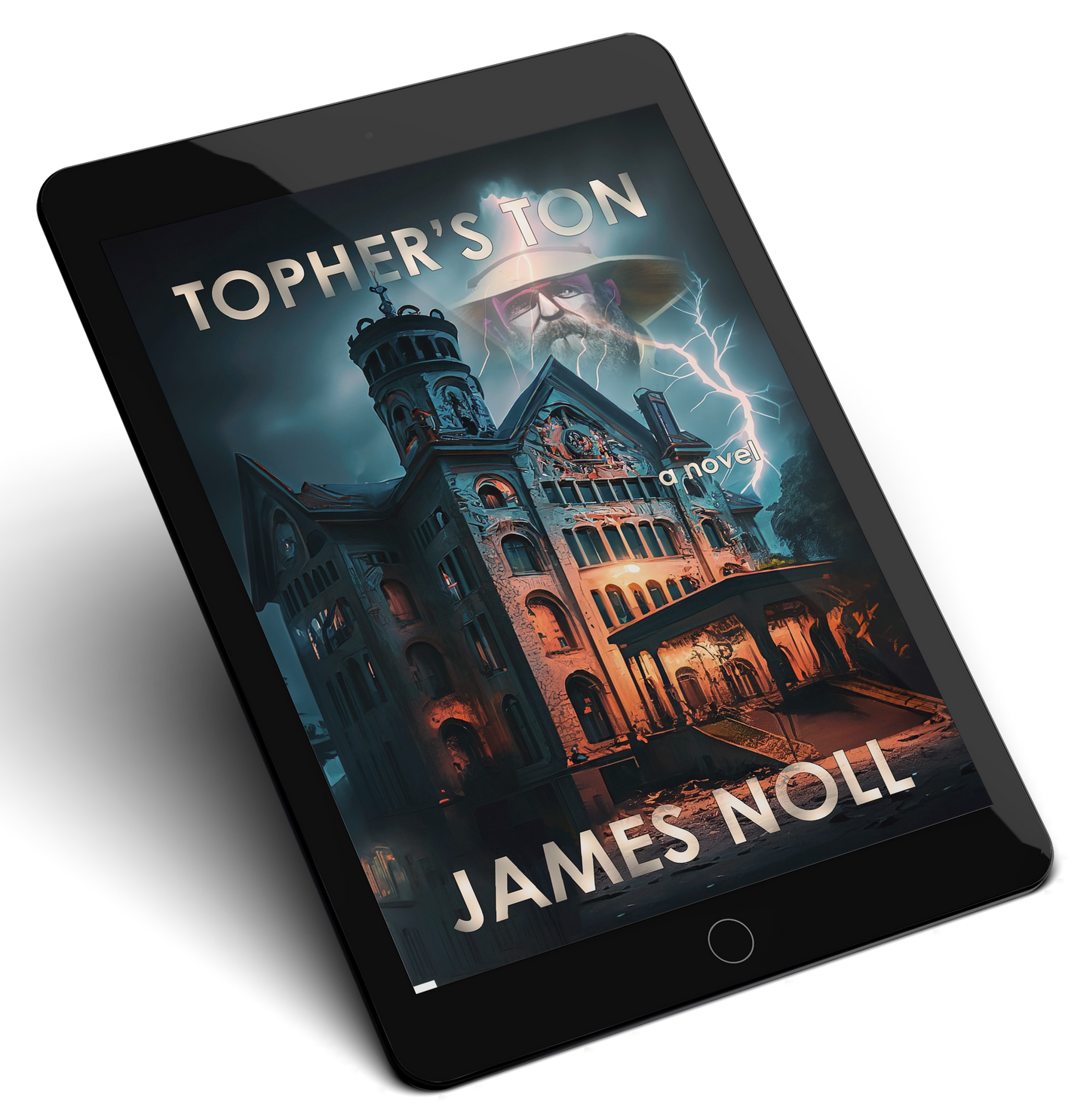
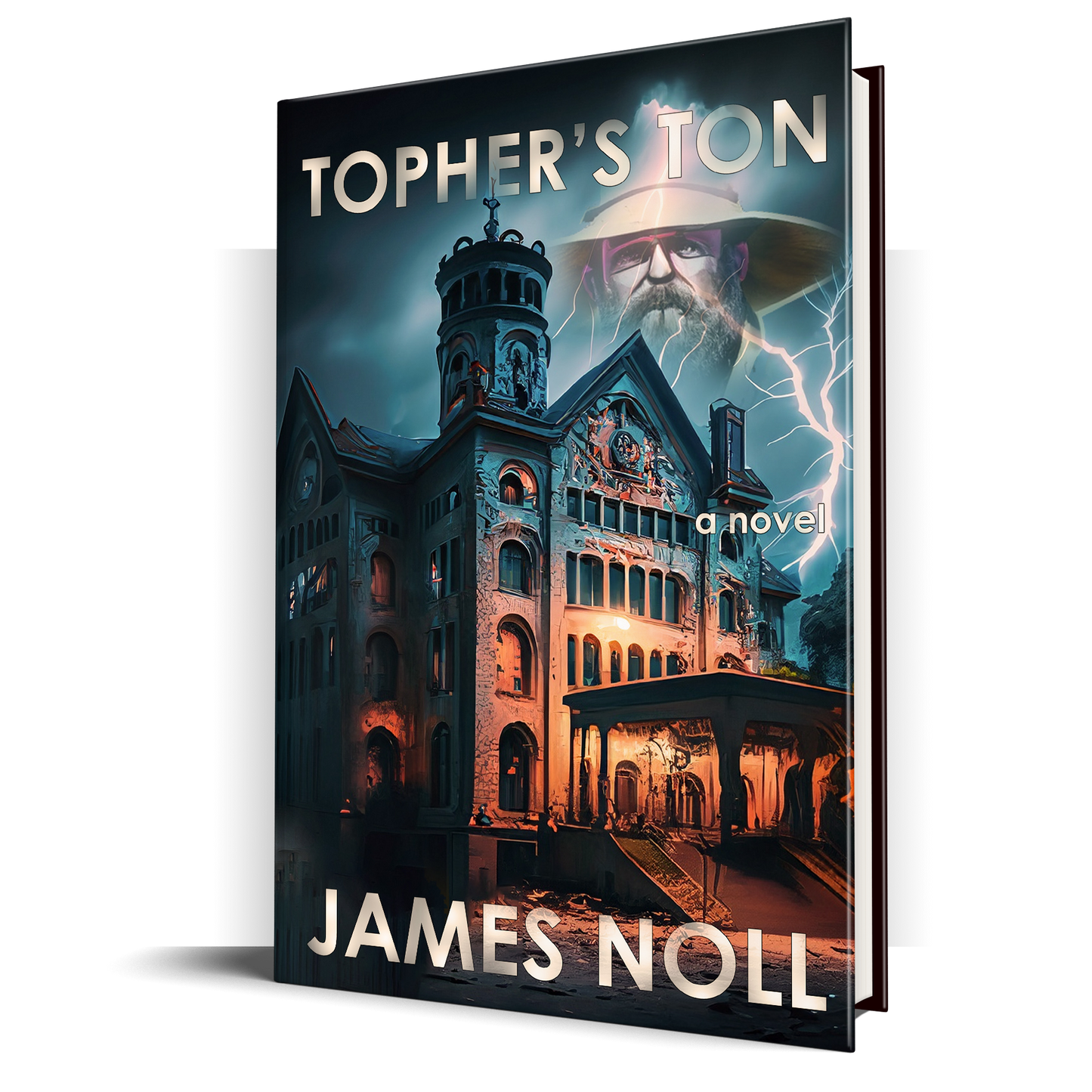
More Books By James
-
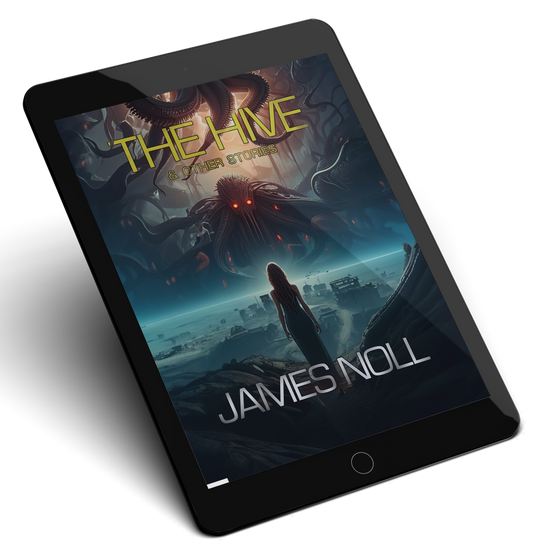 Sale
SaleThe Hive: Season 1
Regular price From $2.99 USDRegular priceUnit price / per$8.99 USDSale price From $2.99 USDSale -
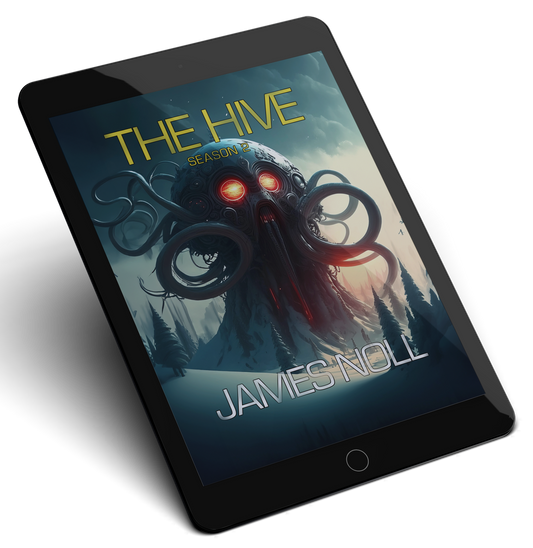 Sale
SaleThe Hive: Season 2
Regular price From $2.99 USDRegular priceUnit price / per$8.99 USDSale price From $2.99 USDSale -
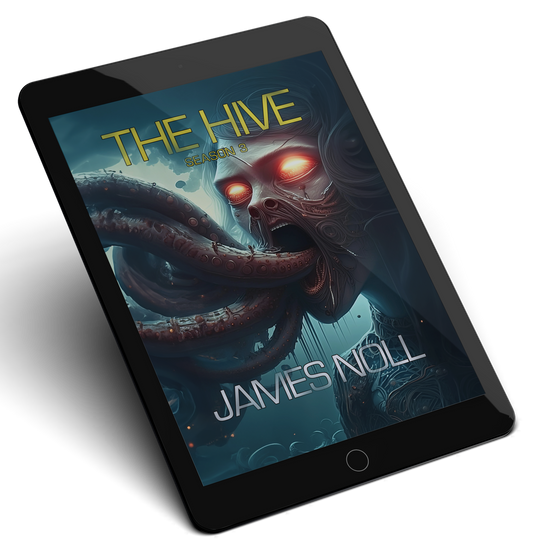 Sale
SaleThe Hive: Season 3
Regular price From $2.99 USDRegular priceUnit price / per$8.99 USDSale price From $2.99 USDSale -
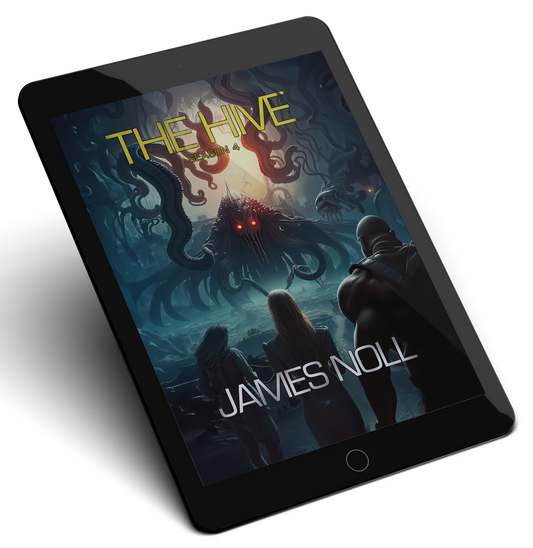 Sale
SaleThe Hive: Season 4
Regular price From $1.99 USDRegular priceUnit price / per$4.00 USDSale price From $1.99 USDSale
FAQ
New to buying directly from authors? It’s quick and simple. Here are some answers to questions you might have.
How do I read an eBook from your store?
BookFunnel, who delivers my eBooks, will send you an email immediately after your purchase. With this email, you can then choose to download the eBook(s) in any format you like (eReader, computer, phone, and more).
What if something goes wrong with my order/download?
BookFunnel has a robust system that will help you. You can access it here: https://bookfunnel.com/help/
How long do physical books take to ship?
As of April 2024, I am personally shipping paperback book orders. I use USPS media mail for USA orders. Books typically arrive within 7-10 business days of being shipped. International orders will take longer.

